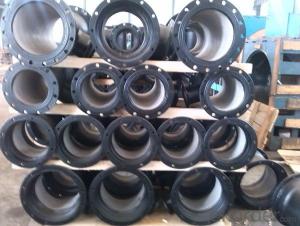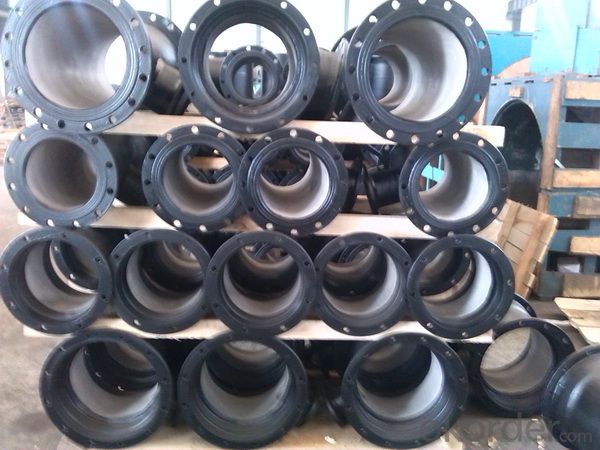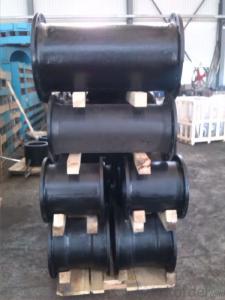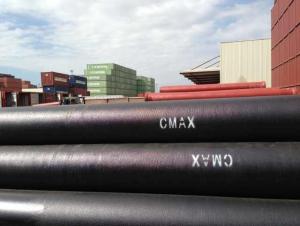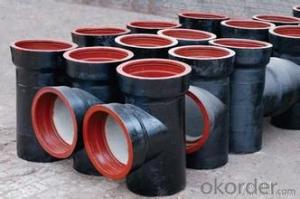DUCTILE IRON PIPE DN1000 K12
- Loading Port:
- Tianjin
- Payment Terms:
- TT OR LC
- Min Order Qty:
- -
- Supply Capability:
- 30000Tons m/month
OKorder Service Pledge
OKorder Financial Service
You Might Also Like
CNBM ductile iron pipe ranges from DN80-DN1600mm (T-Type, Class K9), effective length 6m, comply with ISO2531 Standard
Company Profile
CNBM International Corporation is the leading production base and renowned supplier of Ductile Iron Water Pipe systems of both potable and waste water in China. We are constantly looking to develop high quality products to ensure the longest service life and wonderful performance.
CNBM Pipelines regard quality as the essential factor leading to successful business. Every pipe is tested in accordance with BS EN545 (water application) or BS EN598 (sewer application). CNBM Pipelines products comply with and are tested according to the relevant European and International Standards. Our pipes are manufactured under the quality management system BS EN ISO 9001. After years of efforts, CNBM Pipelines has built up great reputation in terms of quality and service among customers worldwide
Product Introduction
CNBM ductile iron pipe ranges from DN80-DN1600mm (Tyton, T-Type, Class K7/K8/K9), effective length: 6m, complying with BS EN545/EN598/ISO2531/BS4772.
Specification& Payment terms
Internal lining: Pipes shall have an internal cement mortar lining in acc with ISO4179.
External coating: Pipes shall be externally coated with metallic zinc spray plus a further layer of resin painting to ISO8179.
Gasket: 100% SBR/NBR/EPDM gasket in accordance with ISO4633.
Packing: Pipes from DN100 to DN300 be bundled with steel belts, the others are in bulk.
Payment term: By 30% T/T advance payment + 70% Irrevocable L/C at sight.
Packing: In bulk vessel or in container.
- Q: Are ductile iron pipes suitable for power plant applications?
- Yes, ductile iron pipes are suitable for power plant applications. Ductile iron is a type of cast iron that has enhanced strength, durability, and flexibility compared to traditional cast iron pipes. These properties make ductile iron pipes ideal for power plant applications where they are exposed to high pressure, extreme temperatures, and corrosive environments. Power plants often require a reliable and robust piping system to transport various fluids such as water, steam, and chemicals. Ductile iron pipes have high tensile strength and can withstand high pressure, ensuring the safe and efficient flow of these fluids within a power plant. Their ability to handle high-pressure steam makes them particularly suitable for power generation applications. Additionally, ductile iron pipes have excellent resistance to corrosion, which is crucial in power plants where many fluids can be highly corrosive. The internal and external linings of these pipes protect them from corrosion, ensuring a longer service life and reducing maintenance costs. This corrosion resistance also makes them suitable for transporting chemicals and wastewater within a power plant. Another benefit of ductile iron pipes is their ability to withstand extreme temperatures. Power plants often operate at high temperatures, and ductile iron pipes can handle these conditions without compromising their structural integrity. They have a high melting point and can resist thermal expansion and contraction, making them suitable for applications involving hot fluids and steam. Furthermore, ductile iron pipes are cost-effective compared to other materials commonly used in power plants, such as stainless steel or carbon steel. They offer a balance between performance and cost, making them an attractive choice for power plant applications. In conclusion, ductile iron pipes are well-suited for power plant applications due to their strength, durability, flexibility, corrosion resistance, and ability to withstand high pressures and extreme temperatures. Their cost-effectiveness further adds to their suitability for power plant piping systems.
- Q: Can ductile iron pipes be used for bridge piers?
- Yes, ductile iron pipes can be used for bridge piers. Ductile iron is a strong and durable material that can withstand heavy loads and provide structural support, making it suitable for bridge construction.
- Q: How do ductile iron pipes handle ground settlement?
- Ductile iron pipes are highly effective in handling ground settlement due to their inherent flexibility and resistance to deformation. The unique properties of ductile iron, including its high tensile strength and elongation capacity, make it an ideal material for withstanding ground movement. When ground settlement occurs, which is the downward movement of soil or sediment, ductile iron pipes have the ability to flex and adjust to the shifting ground without fracturing. The pipes can absorb the stress caused by the settlement and distribute it evenly along their length, minimizing the risk of cracks or breaks. Furthermore, ductile iron pipes are designed with a bell and spigot joint system, which allows for slight movement and rotation at the joints. This feature enables the pipes to accommodate ground settlement by absorbing any misalignment or shifting of the surrounding soil. Additionally, ductile iron pipes have a higher load-bearing capacity than other materials like PVC or HDPE. This means that they can withstand heavier loads and pressures from the surrounding soil, reducing the risk of pipe failure or collapse during ground settlement. In conclusion, ductile iron pipes are well-suited to handle ground settlement due to their flexibility, resistance to deformation, and ability to distribute stress evenly. Their unique properties ensure that they can withstand the challenges posed by shifting ground conditions, making them a reliable choice for underground infrastructure projects.
- Q: Can ductile iron pipe be used for high-pressure gas systems?
- Yes, ductile iron pipe can be used for high-pressure gas systems. Ductile iron pipes have excellent strength and durability, making them suitable for handling high-pressure gas applications. Additionally, their corrosion resistance properties make them an ideal choice for gas transmission systems.
- Q: How are ductile iron pipes protected against external soil loads?
- Ductile iron pipes are protected against external soil loads through several methods. One of the primary methods is the use of a protective coating on the exterior surface of the pipe. This coating acts as a barrier between the iron pipe and the surrounding soil, preventing direct contact and reducing the risk of corrosion. Another method of protection is the use of trench backfill materials. The soil used for backfilling is carefully selected and compacted to provide adequate support and load distribution for the pipe. This helps to minimize the stress and pressure exerted on the pipe by the surrounding soil. Additionally, the design and installation of the pipe system play a crucial role in protecting ductile iron pipes against external soil loads. The pipes are typically laid in a properly engineered trench, which includes appropriate bedding and backfilling techniques to ensure stability and minimize the potential for damage. Furthermore, the use of proper pipe jointing techniques is essential for protecting against external soil loads. Joints are often designed to be flexible, allowing for some movement and accommodating external loads. This helps to distribute the stress along the length of the pipe and prevents concentrated pressure points that could lead to failure. Overall, a combination of protective coatings, appropriate backfill materials, proper installation techniques, and joint design contribute to the effective protection of ductile iron pipes against external soil loads. This ensures the longevity and reliability of the pipe system, even in challenging soil conditions.
- Q: Can ductile iron pipe be used for fire protection systems?
- Yes, ductile iron pipe can be used for fire protection systems. Ductile iron pipe has excellent resistance to fire, making it a suitable choice for fire protection applications. It is known for its strength, durability, and ability to withstand high temperatures, making it reliable for transporting water or other fire suppression agents.
- Q: Do ductile iron pipes require cathodic protection?
- Indeed, cathodic protection is necessary for ductile iron pipes. Employing this technique safeguards metallic structures against corrosion by designating them as the cathode in an electrochemical cell. Ductile iron pipes face a high susceptibility to corrosion, particularly in harsh soil environments or when exposed to water that harbors substantial amounts of corrosive elements like chlorides or sulfates. By subjecting the pipe to a direct electrical current, cathodic protection effectively thwarts the innate corrosion process. This approach guarantees the durability and soundness of the ductile iron pipes, thereby diminishing the frequency of repairs or replacements.
- Q: How do ductile iron pipes handle internal scale buildup?
- Ductile iron pipes possess exceptional resistance to the accumulation of internal scale, making them highly regarded. The material utilized in these pipes displays remarkable resistance to corrosion, effectively hindering the formation of scale deposits. Moreover, the pipes' sleek internal surface considerably reduces the likelihood of scale adherence. In the unlikely event that scale does commence its formation, ductile iron pipes handle it proficiently. The inherent robustness and durability of ductile iron enable it to withstand the pressure exerted by scale buildup. Consequently, the pipes can maintain efficient functionality, even in the presence of some internal scaling, thereby ensuring a dependable water flow. Nevertheless, it should be emphasized that regular maintenance and periodic cleaning remain imperative in order to prevent excessive accumulation of scale and ensure optimal pipe performance. This can be achieved through a variety of methods, including mechanical cleaning, chemical treatments, or high-pressure water jetting. By adhering to proper maintenance practices, the lifespan of ductile iron pipes can be prolonged, while minimizing any potential issues associated with internal scale buildup.
- Q: How can the connection of ductile iron pipe elbow be convenient for connecting?
- The utility model relates to a groove connecting pipe which has the function of sealing and sealing, and mainly comprises three parts: a sealing rubber ring, a clamping band and a locking bolt. The inner rubber sealing ring is arranged on the outer side of the connecting pipe and is matched with the pre rolling groove, and then the outer ring is buckled on the rubber ring, and then can be fastened with two bolts. Because of the special sealing structure design of the rubber sealing ring and the clamp hoop, the groove connecting piece has good sealing property, and the sealing property is enhanced correspondingly with the increase of the fluid pressure in the pipe.
- Q: How to properly maintain FRP pipes
- Length of single pipe lengthReduce pipe connection, speed up installation, improve the quality of the whole pipeline.
Send your message to us
DUCTILE IRON PIPE DN1000 K12
- Loading Port:
- Tianjin
- Payment Terms:
- TT OR LC
- Min Order Qty:
- -
- Supply Capability:
- 30000Tons m/month
OKorder Service Pledge
OKorder Financial Service
Similar products
Hot products
Hot Searches
Related keywords
